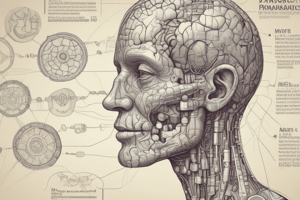Podcast
Questions and Answers
What is the primary effect of hypnotics on an individual?
What is the primary effect of hypnotics on an individual?
- Natural sleep after administration (correct)
- Anxiety and inability to concentrate
- Tranquility and relaxation without causing sleep
- Induction of anesthesia
What is the therapeutic use of barbiturates in epilepsy?
What is the therapeutic use of barbiturates in epilepsy?
- Induction agent in anesthesia
- Anticonvulsant effect (correct)
- Muscle relaxant
- Sedative in anxiety
What is the classification of thiopental based on its duration of action?
What is the classification of thiopental based on its duration of action?
- Long acting
- Intermediate acting
- Ultra short acting (correct)
- Short acting
What is the therapeutic use of diazepam?
What is the therapeutic use of diazepam?
What is the characteristic of sedatives?
What is the characteristic of sedatives?
What is the duration of action of phenobarbitone?
What is the duration of action of phenobarbitone?
What is the therapeutic use of pentobarbital?
What is the therapeutic use of pentobarbital?
What is the classification of CNS drugs?
What is the classification of CNS drugs?
Flashcards are hidden until you start studying
Study Notes
CNS Drugs Classification
- CNS drugs are divided into two groups: CNS depressants and CNS stimulants
- CNS depressants are further divided into eight subgroups
CNS Depressants
- Sedatives & Hypnotics
- Analgesic & antipyretic
- Anti-Anxiety (Anxiolytic)
- Anaesthetics
- Antidepressant
- Antiepileptic
- Drugs used in Parkinson's disease
- Antipsychotics
Sedatives & Hypnotics
- Insomnia: characterized by inability to sleep, anxiety, and inability to concentrate
- Sedatives: drugs that cause tranquility, comfort, and relaxation without causing sleep
- Hypnotics: drugs that cause natural sleep
Barbiturates
- Therapeutic uses:
- Sedative in anxiety
- Hypnotic in insomnia
- Induction agent in anesthesia
- Anti-convulsant in epilepsy
- Classification of Barbiturates:
- Ultra short acting (5-10 minutes): used before general anesthesia (e.g., thiopental)
- Short acting (2-4 hours): (e.g., secobarbital)
- Intermediate acting (4-6 hours): (e.g., pentobarbital)
- Long acting (6-12 hours): (e.g., phenobarbitone)
Non-Barbiturates
- Benzodiazepines:
- Therapeutic uses:
- Hypnotic sedative
- Anxiolytic
- Anti-convulsant
- Used in irritable bowel syndrome
- Muscle relaxant
- Therapeutic uses:
- Examples of non-barbiturates:
- Emazepam
- Diazepam
Studying That Suits You
Use AI to generate personalized quizzes and flashcards to suit your learning preferences.




